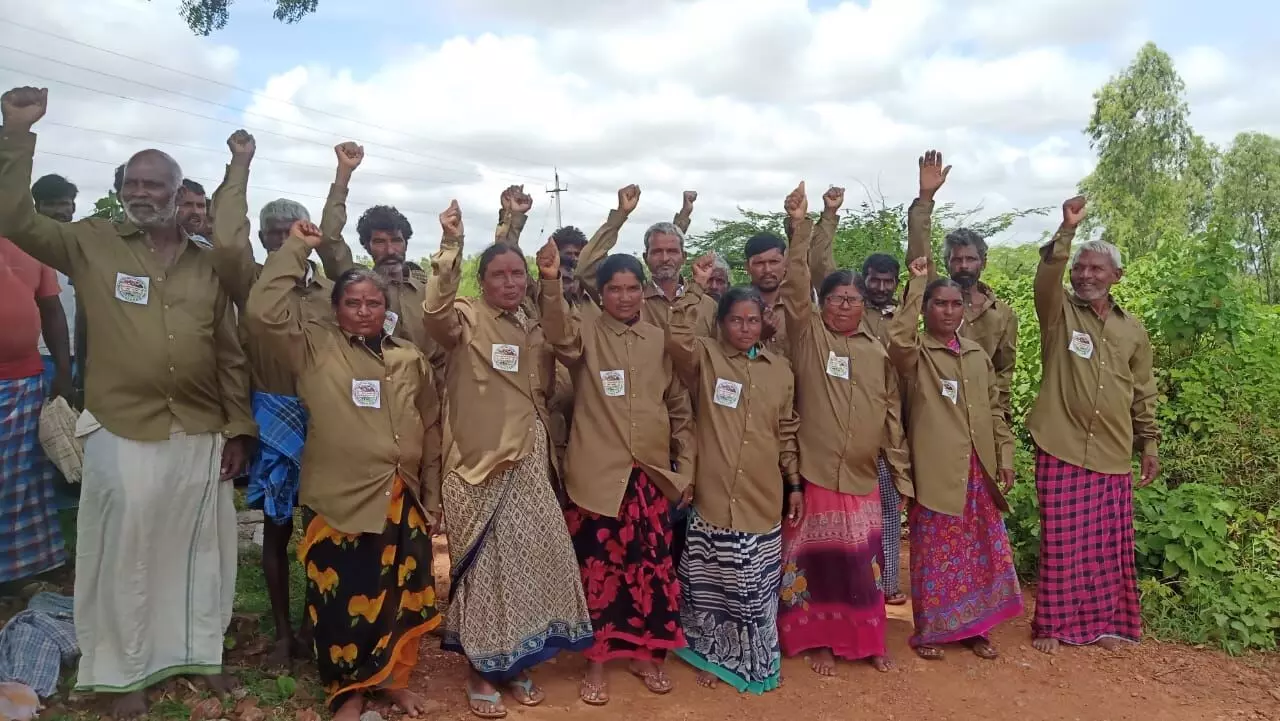Ever since Hanumantappa began working with the ‘labour bank’, a wind of positive change has swept almost every facet of his life. In a family of seven members, including three children, Hanumantappa, a resident of Kadaramandalagi village of Haveri district in Karnataka earlier worked as a labourer but employment opportunities were erratic and incomes frugal.
“Presently, I am working on a MGNREGA [Mahatma Gandhi National Rural Livelihood Guarantee Act] project to build a water canal. Even when the MGNREGA work is not available, I easily find employment in and around my village and no longer struggle with searching for jobs,” Hanumantappa told Gaon Connection.

Labourers are being informed about MGNREGA in Haveri district, Karnataka
Hanumantappa is one of the 4,000 workers in the forty villages which fall under the four talukas of Ranebennur, Byadagi, Hirekerur and Hangal who are members of the ‘labour bank’ set up by the Vanasiri Rural Development Society (VRDS) in 2018.
“Earlier, the livelihood opportunities were very limited. I barely earned two thousand rupees per month and it was getting impossible to make ends meet. But now, I not only find work in the vicinity of my village but my income has soared. I easily earn upto Rs 9,000 in a month,” Hanumantappa said gladly.
Also Read: Towards Gram Swaraj: Gangakhedi village in Jhabua leads with decentralised planning
Functioning of the labour bank
The labour banks set up by VRDS basically act as a vital link between the land-owning farmers and the landless labourers.
“Any labourer can become a member of the labour bank with a membership fee and by paying a commission of two point five per cent from their wages of a month,” informed SD Baligar, the chief executive officer [CEO] of VRDS.
“We work to provide labourers to farmers on a daily or a contractual basis, it is an effort to remove the gap between the two and provide job opportunities locally. Without the labour bank, earlier labourers had to migrate to far off areas in search of work and had to leave their families behind which not only added to their expenses but also caused immense emotional distress,” he added.
So far, Rs 11,45,000 have been raised from the membership fee from 3,500 labourers and service charges of 2.5 per cent against the wages earned through labour bank.
Sachin Budihal, a daily wage labourer from Aralikatti village in Haveri district agrees with the CEO.
“Earlier we were forced to migrate to coastal regions or large cities for work. With the help of the labour bank, I can find work easily. It has helped to reduce the migration in search of work. Our children don’t suffer due to the absence of their father anymore,” Budihal told Gaon Connection.
Also Read: Farmers in Bahraich, Uttar Pradesh adopt ‘Berkeley compost’ to grow vegetables
Helps in maintaining a steady workforce
Basappa Kajjari, a farmer who owns 16 acres of agricultural land from Khurda Kodihalli village in Byadgi taluk of Haveri district explained to Gaon Connection how the problem of searching for labourers for his fields has been solved by the labour bank.
“Our village has only land-owning farmers and there are no labourers to be found here. Earlier, I faced a lot of difficulty in accessing labourers. Now, whenever I need labourers, I directly call the labour bank and on contract basis, the required number of labourers are easily provided,” said Kajjari.

Members of Mahatma Gandhiji Kattada Mattu Itare Kulikarmikara Sangha, Haveri district, Karnataka
However, according to the CEO of the initiative, despite the smooth functioning of the labour bank, the initiative faces two major problems.
“First, though the MGNREGS guarantees to provide a hundred days of employment, it is not easy to get a job due to the hierarchy in the system and lack of knowledge. Secondly, the labour bank presently lacks the transportation facility,” he said.
“Sometimes farmers pay for the transportation, mostly on contract basis, labourers working on daily wages have to travel by themselves,” Baligar added.


















